Conflict Zones
Death, debris and anger about Trump after Russia’s strike on Kyiv | Russia-Ukraine war News
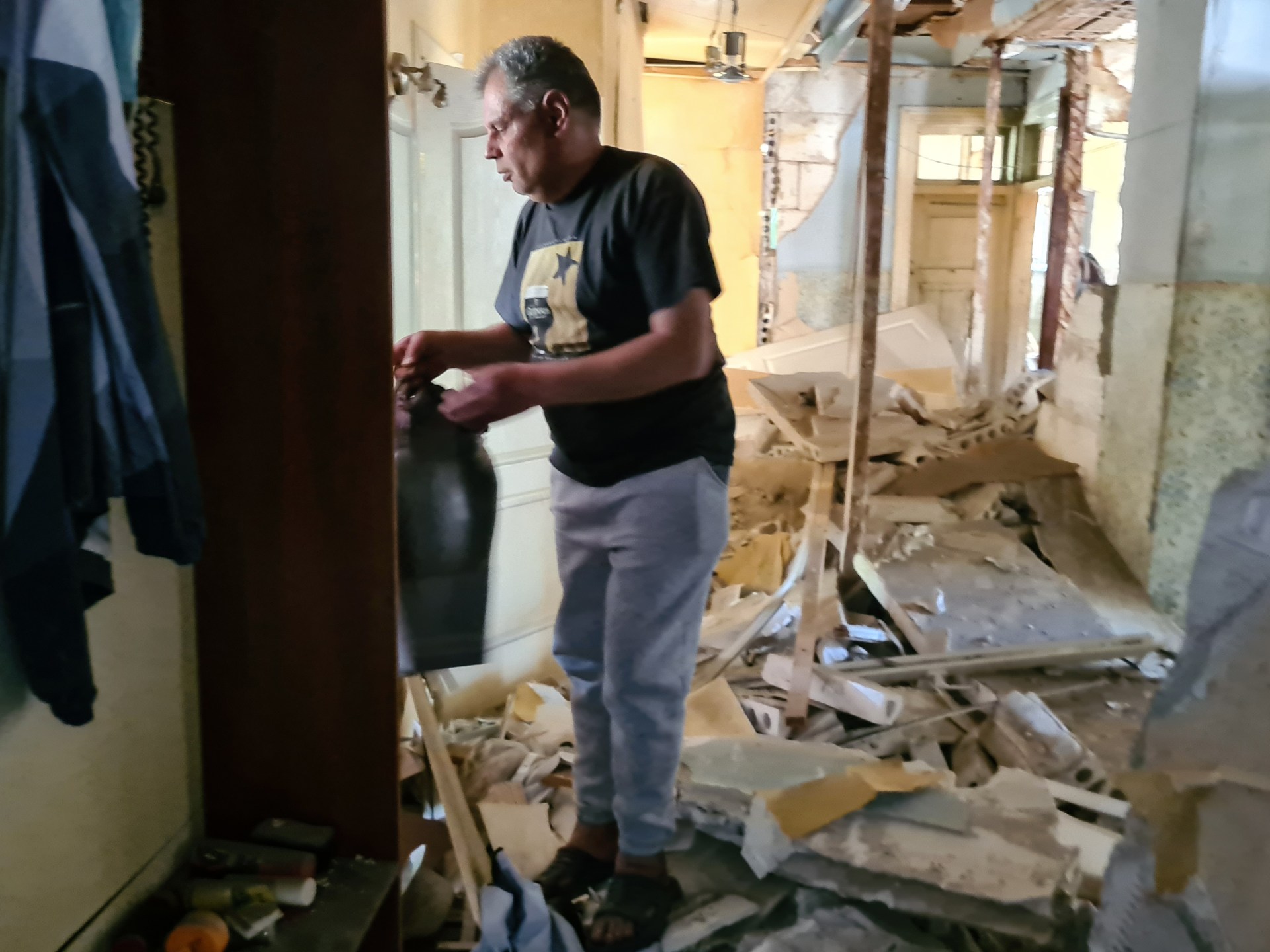
Kyiv, Ukraine – Serhiy Parkhomenko’s two-storey apartment building stood right next to its twin that was struck and levelled by a Russian missile early on Thursday.
The unbearably red, eardrum-rupturing explosion killed 12, wounded 87, gouged out windows and damaged roofs in dozens of nearby buildings of the tranquil, leafy neighbourhood in northwestern Kyiv.
The shockwave caused Pakhomenko’s steel entrance door to fly through his living room, flattening a cosy armchair he or his wife used to sit in during hundreds of earlier shellings.
Luckily, they were in bed during the 1am [23:00 GMT on Wednesday] strike, the largest in Kyiv since the July 2024 bombing that damaged Ukraine’s largest children’s hospital and killed 34.
The Parkhomenkos hastily grabbed their documents and rushed outside. Serhiy also managed to drag his 68-year-old next-door neighbour out of the debris of his apartment.
“I have been really lucky,” Parkhomenko, 60, a telecommunications expert, told Al Jazeera, standing next to his broken furniture and a flatscreen TV that somehow remained intact.
What most confounds him has been the White House’s inaction over the death and destruction caused by Russia in Ukraine since Donald Trump’s re-election as United States president.
Trump turns a “blind eye” to what Russian President Vladimir Putin does in Ukraine, Parkhomenko insisted.

The neighbour he had saved was sitting on a bench wrapped in a blanket, his face cut and bruised, and kept repeating: “You won’t frighten us.”
Even though Trump wrote “Vladimir, STOP!” in a social media post on Thursday, US Vice President JD Vance said a day earlier that Washington would refuse to mediate peace talks if Kyiv and Moscow don’t start them within days.
“We’ve shown them the finish line,” Secretary of State Marco Rubio said on Thursday in the Oval Office after news of the strike on Kyiv. “We need both of them to say yes, but what happened last night with those missile strikes should remind everybody of why this war needs to end.”
Close to Parkhomenko was an American who arrived in Kyiv to teach Ukrainian servicemen English and join Dobrobat, a volunteer group that rebuilds houses all over the war-battered nation.
“I feel a moral obligation to come and help,” Tom Satterthwaite, who once led researchers on salmon spawning in Oregon’s dammed rivers, told Al Jazeera while hauling broken bricks and stucco downstairs.
He said the White House had failed to uphold its security guarantees to Kyiv, according to the Budapest Memorandum.
The 1994 deal prohibited Moscow, Washington and London from using military force against Ukraine in return for its abandonment of nuclear weapons.
Kyiv inherited the world’s third-largest nuclear stockpile from the Soviet Union after its 1991 collapse but agreed to transfer it to Russia in return for the security guarantees.
“Ukraine got the shaft on the deal,” Satterthwaite said.

Saved by her glasses
The destruction and debris after the shelling seemed shocking to some foreign volunteers. But to the head of the Dobrobat volunteer group that invites and hosts them, the scene was familiar.
“We got used to it,” Dmytro Ivanov told Al Jazeera as other volunteers ran up and down the stairs in Parkhomenko’s building. “We see it every day.”
Russia’s strike on Ukraine on Thursday involved 70 missiles and 145 explosives-laden drones.
The Kremlin’s spokesman, Dmitry Peskov, claimed that the strike had targeted “military and military-adjacent sites”.
But the destroyed house next door to Parkhomenko was about a kilometre away from the Antonov Serial Production Plant, a century-old aircraft manufacturer that once produced Mriya (Dream), the world’s largest plane. The plant was burned down by Russian troops in February 2022.
But the strike on Thursday did not hit the plant if that was indeed the target. Instead, it damaged a dozen apartment buildings in the area.

Most of the victims were in the building next to Parkhomenko’s, which was almost completely levelled.
One of the survivors was Yelena, a blonde woman in her 40s whose impeccable hairdo, makeup and glasses contrasted with everything around her.
The glasses are what saved her, seconds after the strike when she moved to grab them – and her upstairs neighbour’s gas stove fell on the spot she’d just been standing in.
The blast collapsed the inner walls and ceiling of her first-floor corner apartment, while her husband Viktor saved his upstairs neighbour’s two-year-old girl from the debris.
She and her husband crawled outside to see their car mauled by the shockwave, while natural gas pipes in the building were “bursting like ropes” and neighbours yelled for help, she told Al Jazeera.
They spent hours helping them in the darkness and panic before finding out the girl’s mother had been killed.

‘There are still people down there’
At dawn, once the shock and adrenaline had worn off, Yelena realised her hair was full of broken glass, brick fragments and asbestos dust.
She rushed to her relative’s apartment to clean up and then came back to retrieve whatever was left of her belongings.
“No apartment, no car, no stuff,” she said with a sardonic smile, standing next to a dozen black garbage bags with her belongings and a microwave-sized power bank she’d been using during blackouts caused by Russia’s strikes on energy infrastructure.
Rescue workers kept excavating the debris looking for survivors, while officials registered the residents. Communal workers unfurled and cut pieces of transparent plastic film to replace broken window glass.
“There are still people down there,” Yelena said.
The strike took place on the 99th day of Trump’s second presidency whose boastful pledge to end Europe’s bloodiest conflict since World War II “within 24 hours” has proved futile.
The Kremlin has continued to produce conditions for a ceasefire – and continues the ferocious shelling of Ukrainian cities almost daily.
“They say they hit military sites, but keep striking civilian areas,” Viktor, a 59-year-old survivor whose face and scalp were cut by glass shards, told Al Jazeera as he stood next to his 90-year-old mother.
Close by, a teenage boy wept and moaned uncontrollably on a bench, having just learned that his 17-year-old friend and his friend’s parents had been found dead.
Conflict Zones
At least 11 killed in suspected RSF drone attack on Sudan displacement camp | Sudan war News
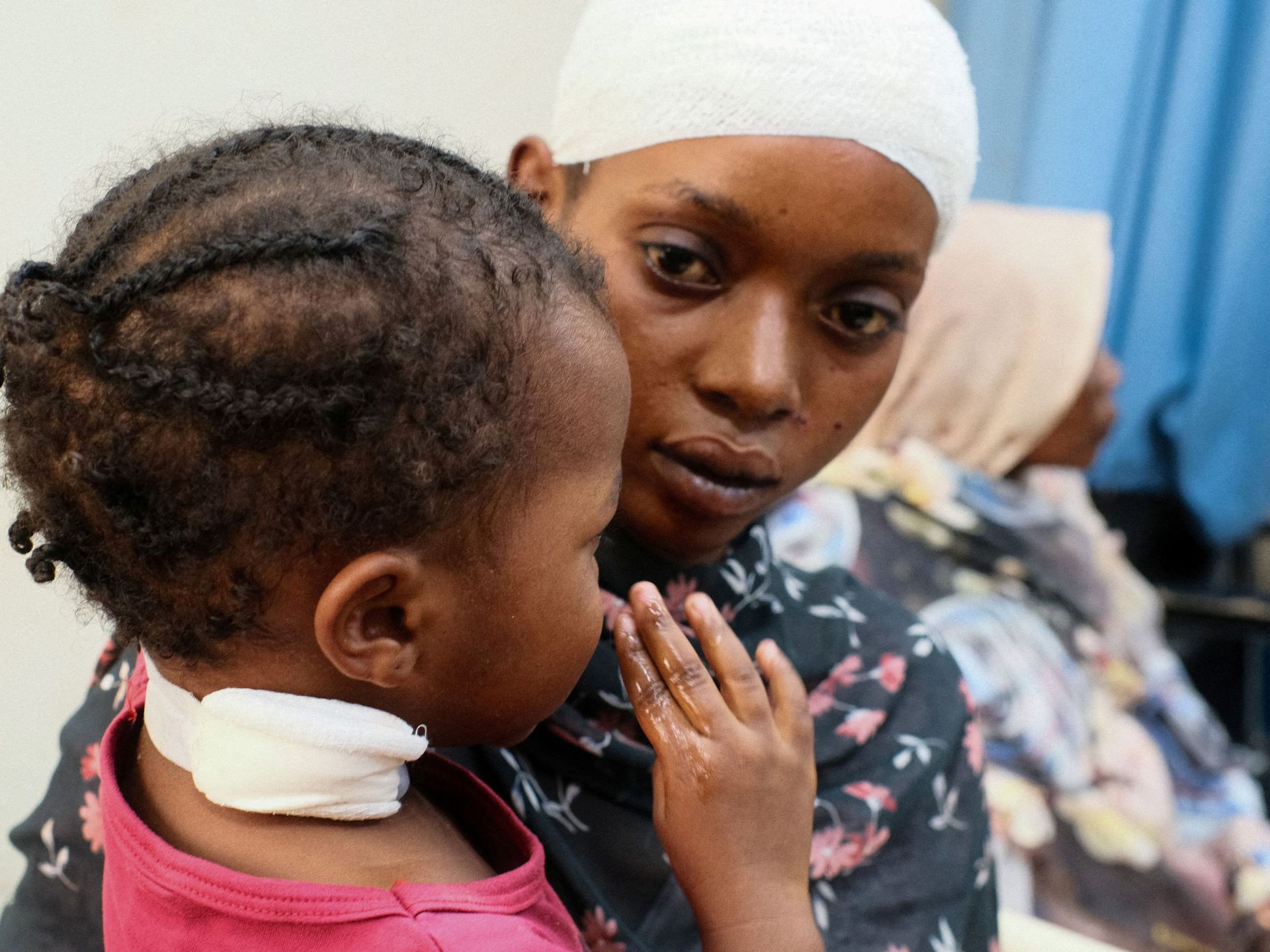
Local governor says the attack knocked out a nearby power station for the fourth time since the war began two years ago.
A suspected drone attack by Sudan’s Rapid Support Forces (RSF) paramilitary has killed at least 11 people at a displacement camp in River Nile state, authorities said.
In a statement late on Friday, the local governor said the attack knocked out a nearby power station for the fourth time since the war between the RSF and the Sudanese army began two years ago.
The attack marks a deadly escalation in the ongoing conflict, with a further 23 people injured, a medical official said. Witnesses said at least nine children were among the wounded.
“My son, my cousin, my daughter’s husband and two children, my cousin’s children are dead. The boy is 10 years old and the girl is about two years old,” witness Haleema told Al Jazeera.
Over the past months, the RSF has been accused of attacking power infrastructure in Sudanese army-controlled areas across central and northern Sudan.
The RSF, led by Mohamed Hamdan Dagalo, known as Hemedti, denies carrying out drone attacks.
Friday’s attack hit a makeshift camp roughly 3km (2 miles) from the Atbara power station outside the town of al-Damer.
The camp housed about 180 families who had fled fighting in the capital, Khartoum, and were living in abandoned buildings and tents with minimal humanitarian assistance.
“The first drone attack came and landed right behind us,” said Mawaheb Mohamed, another survivor of the attack.
“Fifteen minutes later, another one came – four in total. He decided to leave because the scene was very difficult, there were corpses, people had been dismembered, and people in the hospital.”
Following the attack, authorities were seen hosing down the smouldering remains of tents and belongings, as residents boarded buses headed to an unknown location.
The escalation came amid a wider collapse of Sudan’s power grid, with drone and missile attacks plunging millions into weeks-long blackouts, further worsening the humanitarian crisis in a country devastated by civil war.
Sudan descended into violence in April 2023 when tensions between the Sudanese army, led by Abdel Fattah al-Burhan, and the RSF erupted into open conflict.
Al-Burhan has been celebrating recent gains made by the military, including in Khartoum, while ground fighting is currently concentrated in the Darfur region, where the RSF is battling to eliminate remaining army positions, forcing hundreds of thousands to flee.
The conflict has triggered one of the world’s largest displacement crises. According to the United Nations, more than 12.4 million people have been uprooted from their homes, including 3.3 million who have fled to neighbouring countries.
Conflict Zones
DR Congo, Rwanda agree to draft peace deal by May 2 | Conflict News
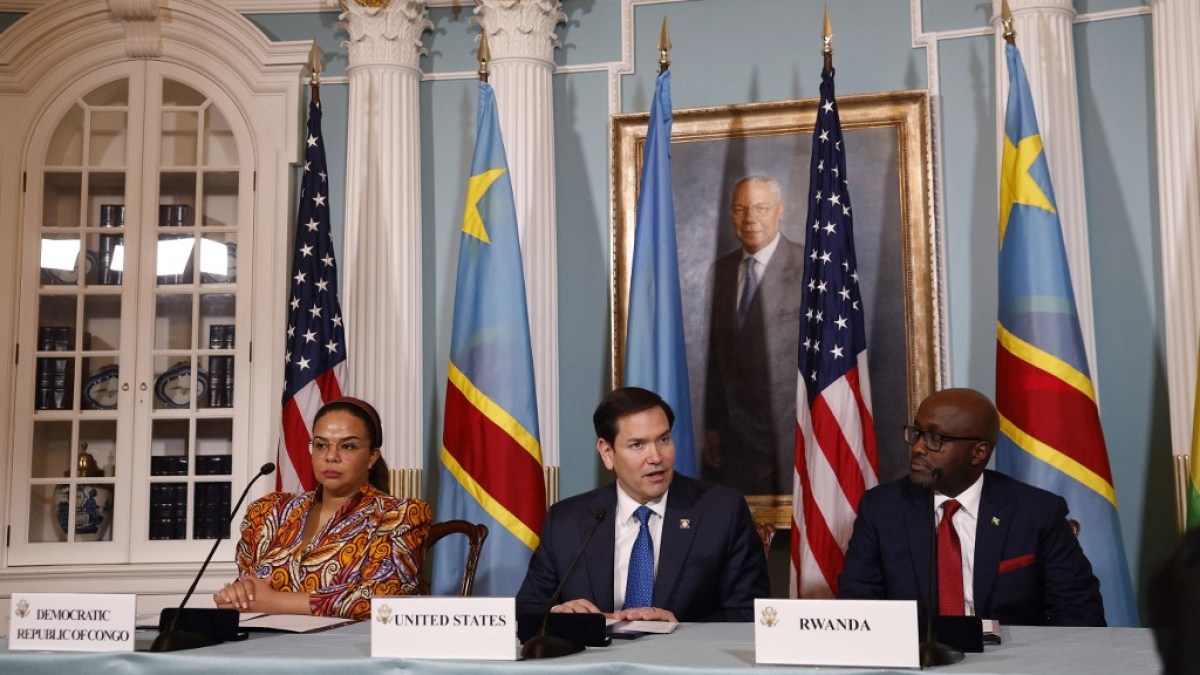
US brings the two countries’ foreign ministers together and voices an interest in investment in the DRC’s mineral-rich east.
Rwanda and the Democratic Republic of the Congo (DRC) have agreed to draft a peace deal by May 2, committing to respect each other’s sovereignty and refraining from providing military support to armed groups.
DRC Foreign Minister Therese Kayikwamba Wagner and her Rwandan counterpart Olivier Nduhungirehe signed the agreement in a tense meeting in Washington, DC, on Friday, in which the two did not shake hands.
The deal, part of diplomatic efforts to end the violence in eastern DRC, came two days after Qatar brokered an unexpected truce between the African nations.
The United States brought the two countries’ foreign ministers together and voiced an interest in investment in the DRC’s turbulent but mineral-rich east, where fighting between DRC forces and M23 rebels has intensified since January. The M23 has captured key cities in the east in a campaign that has left thousands dead.
The US and the United Nations experts say M23 is backed by Rwanda, which has repeatedly denied the charge, saying it is defending its security against hostile militias operating in DRC, including remnants of the Hutu-led group behind the 1994 genocide.
Friday’s joint declaration, signed in front of US Secretary of State Marco Rubio, pledged the two sides would halt military support to non-state armed groups, though it avoided naming M23 directly.
Wagner later said the deal amounted to a commitment for Rwandan forces to withdraw, as outlined in a UN Security Council resolution.
“The good news is there is hope for peace. The real news – peace must be earned, and it will require seriousness, transparency and sincerity,” she said.
Nduhungirehe said US President Donald Trump had made a “real change in the conversation” on DRC, including by drawing a link to efforts to expand US private-sector investment.
Rubio described the agreement as a “win-win”, suggesting it could unlock major US-backed investment in energy and mining – areas where China already has significant influence. A new US envoy to Africa, Massad Boulos, recently visited both nations and urged Kigali to stop backing M23 and pull out troops.
Since 2021, the two sides have agreed to at least six truces that later collapsed. The latest bout of violence since January has killed thousands and raised fears of a wider regional war.
Analyst Martin Ziakwau Lembisa believes the US pressure pushed both governments towards diplomacy.
“If it were up to the M23, they would have advanced further,” he told AFP news agency. “But how far the Americans will really get involved is the whole question.”
Conflict Zones
Indian soldiers demolish homes of Pahalgam attack suspects in Kashmir | Conflict News
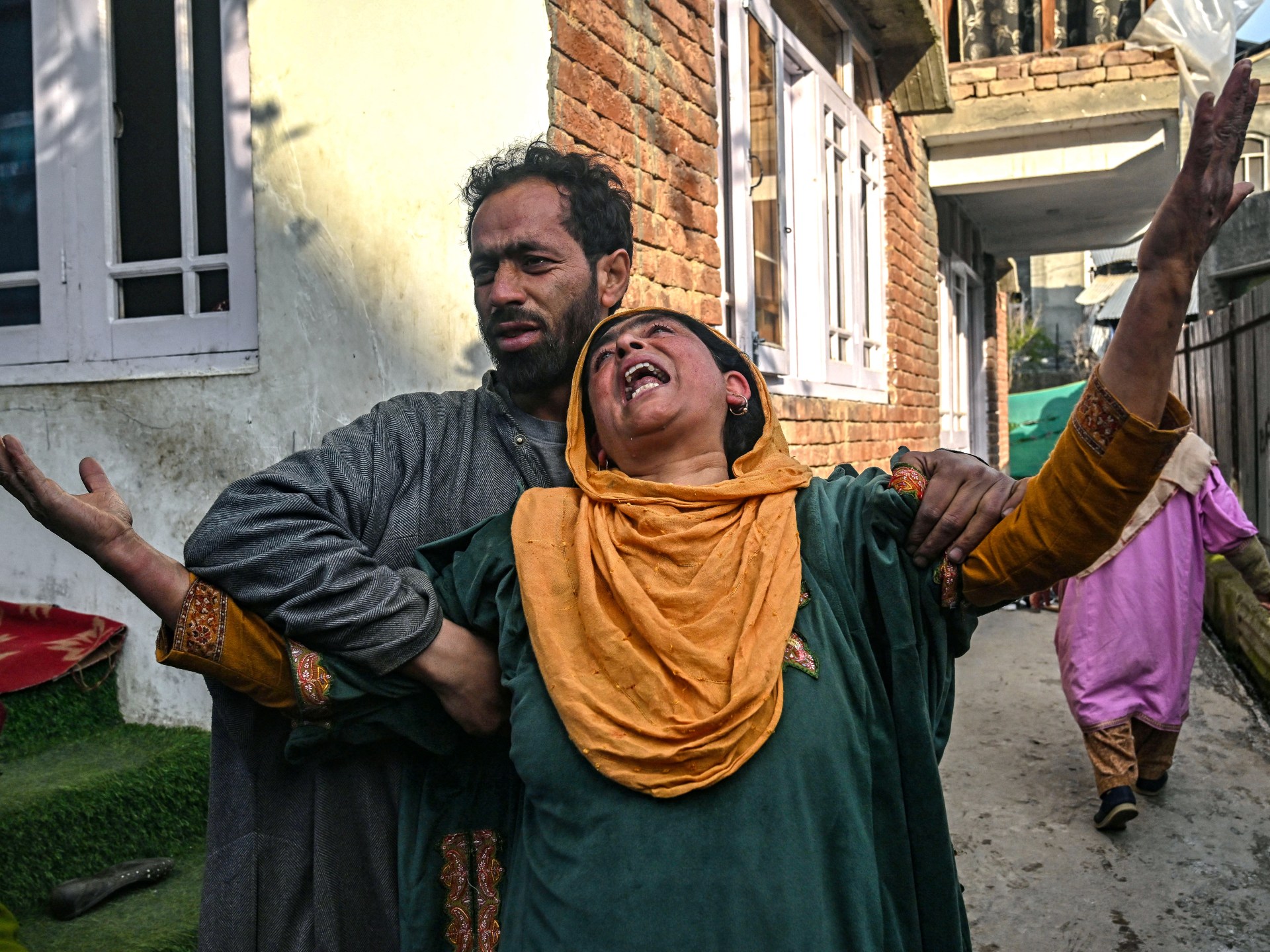
Soldiers in Indian-administered Kashmir have demolished the homes of two men suspected of carrying out the disputed region’s deadliest attack against civilians in nearly two decades.
Police say the attackers are members of The Resistance Front (TRF), a faction of Pakistan-based Lashkar-e-Taiba (LeT). Pakistan rejects the allegation.
Meanwhile, Indian security forces have launched a huge manhunt for those responsible for killing 26 men in Pahalgam on Tuesday.
Authorities have released wanted posters with sketches of three suspects: Adil Hussain Thokar, a suspected Kashmiri rebel, and two Pakistani citizens identified as Ali Bhai and Hashim Musa. They are also searching for Ashif Sheikh, another suspected rebel.
The family members of the two suspected rebels were also detained for questioning after the attack, a police officer and their relatives said.
Sheikh’s sister Yasmeena said soldiers cordoned off the area around their house in Kashmir’s southern Tral area late on Thursday night.
“One soldier climbed over the mud compound wall of our home,” said Yasmeena, who gave only one name.
“After some time, a big, frightening blast brought the house down. Everything inside was destroyed,” she said, adding that no one was inside the home at the time.
A police officer said soldiers also destroyed Thokar’s family home in neighbouring Bijbehara area in the same manner early on Friday.
“Both [suspected rebels] have been active for three to four years, and are part of TRF, which is an offshoot of LeT,” the officer told AFP news agency on condition of anonymity as he was not authorised to speak to the media.
“They are wanted militants [rebels] involved in earlier attacks as well on security forces,” the officer added.
Police have also offered a two million rupee ($23,500) bounty for information leading to each man’s arrest.
-

 Education22 hours ago
Education22 hours agoHavard students and faculty face the fallout from a showdown with Trump
-

 Africa2 days ago
Africa2 days agoTanzania’s cat and mouse politics: Treason, arrests and shrinking political space
-
Conflict Zones2 days ago
‘We’re cursed’: Kashmiris under attack across India after Pahalgam killings | Armed Groups News
-

 Middle East2 days ago
Middle East2 days agoIran to sign $4bn oilfields deal with Russia in bid to bolster ties | Business and Economy News
-

 Europe2 days ago
Europe2 days agoCardinals seal Pope Francis’ coffin, formally ending his lying in state at the Vatican
-
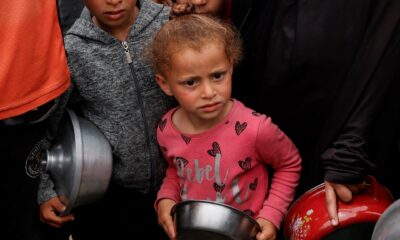
 Middle East2 days ago
Middle East2 days agoUN says its food stocks in Gaza completely ‘depleted’ amid Israeli blockade | Gaza News
-

 Europe2 days ago
Europe2 days agoVatican asks visitors not to take selfies with late pope
-
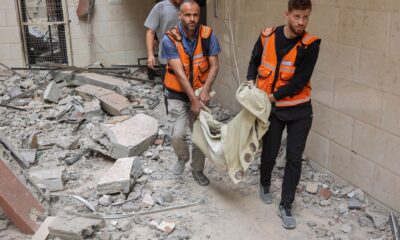
 Middle East22 hours ago
Middle East22 hours agoThirteen killed, dozens under rubble as Israel bombs Gaza amid food crisis | Israel-Palestine conflict News




